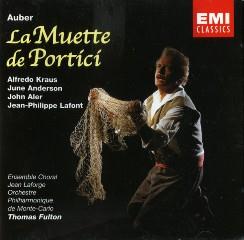Daniel François Esprit Auber – La Muette de Portici (1987)
Daniel François Esprit Auber – La Muette de Portici (1987)

1-1 Ouverture 7:30 1-2 N.1 Introduction & Air: Du Prince Objet De Notre Amour 8:17 1-3 N.2 Recitatif & Choeur: Mais Du Cortege Qui S'avance... Du Prince Objet De Notre Amour 2:36 1-4 N.3 Air: Plaisir Du Rang Supreme 8:21 1-5 Ballet: Guarache 1:27 1-6 N.4 Scene & Choeur De La Chapelle: Dans Ces Jardins, Quel Bruit Se Fait Entendre? 10:39 1-7 N.5 Finale: Ils Sont Unis! 8:14 1-8 N.6 Choeur & Recitatif: Amis, Amis, Le Soleil Va Paraitre 5:47 1-9 N.7 Barcarolle: Amis, La Matinee Est Belle 6:20 1-10 N.8 Duo: Mieux Vaut Mourir Que Rester Miserable 9:15 1-11 N.9 Finale: Venez, Amis, Venez, Venez Partager Mes Transports 6:36 2-1 N.10 Duo: N'esperez Pas Me Fuir 8:19 2-2 N.11 Choeur De Marche: Au Marche Qui Vient De S'ouvrir 4:09 2-3 N.12 Finale - Scene: Non, Je Ne Me Trompe Pas, C'est Bien Elle 7:36 2-4 N.13 Air & Cavatine: Spectacle Affreux 11:21 2-5 N.14 Cavatine & Choeur: Mais On Vient. C'est Pietro 10:58 2-6 N.15 Scene & Choeur: Des Etrangers Dans Ma Chaumiere 6:52 2-7 N.16 Marche & Choeur: Honneur Et Gloire! Celebrons Ce Heros 4:42 2-8 N.17 Barcarolle & Choeur: Voyez Du Haut De Ces Rivages 5:10 2-9 N.18 Finale: On Vient! Silence, Amis! 13:48 Soprano Vocals – June Anderson Mezzo-soprano Vocals – Martine Mahé Tenor Vocals – Alain Munier, Alfredo Kraus, John Aler Baritone Vocals – Jean-Philippe Lafont Bass Vocals – Daniel Ottavaere, Frédéric Vassar, Jean-Philippe Courtis Ensemble Choral Jean Laforge Orchestre Philharmonique De Monte-Carlo Conductor – Thomas Fulton
With La Muette de Portici, Daniel-François-Esprit Auber and Eugène Scribe created a new genre of nineteenth century opera. It was to become known as French grand opera, and other practitioners of the genre would include Meyerbeer, Rossini, and Halévy. Eugène Scribe was the literary genius behind the form who wrote many of the texts for these composers, including La Juive, Les Huguenots, and Robert le Diable, three of the biggest hits of the nineteenth century Paris Opéra. Grand opera contained lavish sets, large crowd scenes, choruses, processions, ballets, huge tableaux, extravagant scenic effects, and sensational stories with often revolutionary themes. The political fervor of the story and music of La Muette made it instantly popular throughout Europe. It became associated with revolutionary ideas after it inspired an uprising in Brussels which led to the creation of an independent Belgian state, and it is thought to have spurred unrest in France itself in 1830. In accordance with the sensationalist tendencies of grand opera, Scribe has the revolutionary leader Masaniello go mentally insane after he has been poisoned, and has his sister Fenella hurl herself into Mount Vesuvius, just as it begins to erupt.
The libretto to La Muette, written by Germain Delavigne, was originally in three acts. The censors demanded changes to the text, and Scribe rewrote it several times before coming up with a dramaturgically successful solution. In accordance with the censor's demands, he suppressed much of the revolutionary material. But he also expanded the work into a five-act creation and added the main character of Fenella. She is a mute girl who expresses herself only through pantomime acted out against dramatic orchestral accompaniments. She is the sister to the fisherman Masaniello, and she has been betrayed and seduced by a member of the Spanish ruling class. It is Masaniello who will later become, partly because of the fate of his sister, the leader of the revolutionaries who take back the city of Naples from the Spanish. The fates of Masaniello and his mute sister are delicately intertwined throughout the opera. She is driven to suicide by the violent events of the revolution and the tragedy of her own betrayal, while he is eventually murdered by the very men whom he led to victory against the Spanish nobility. The story of Masaniello was set several times in the nineteenth century. He was an actual historical figure, and did lead a popular revolt against the Spanish in Naples in 1647. The character of Fenella was taken from an 1822 Walter Scott novel called Peveril of the Peak. The tradition of pantomime was taken from the French melodramme, and added an effective touch of pathos and dramaturgical balance to the violence of the story. ---Rita Laurance, allmusic.com
download (mp3 @320 kbs):
yandex mediafire ulozto bayfiles








